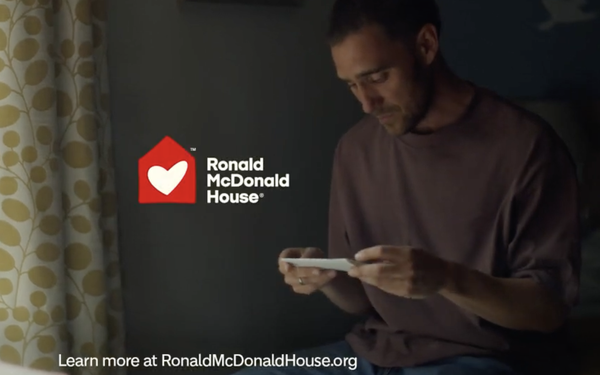
Ronald McDonald House,
formerly known as Ronald McDonald House Charities, is reintroducing itself with a campaign designed to reach millennial and Gen Z audiences internationally.
The “Family Stays”
campaign aims to inform audiences about the nature of the charitable organization’s services, which go well beyond housing for families who must travel for medical treatments.
Ronald
McDonald House operates over 394 housing locations across 60 countries and regions. But while roughly 80% of people are aware of the organization, about two-thirds don’t recognize the extent of
the work it does, Ronald McDonald House President and CEO Katie Fitzgerald told Marketing Daily. Its services include transportation to and from hospitals, classroom and educational services,
food and nutrition programs, and mental health support.
advertisement
advertisement
At the center of the campaign is a 90-second “Road Trip” video that launched Oct.
15, alongside the 30-second “A Dad’s Perspective” and 15-second “The Kitchen.” Inspired by real letters written by families, each ad is also voiced by a Ronald McDonald House family member.
Fitzgerald said the preexisting practice of families leaving behind letters of encouragement at Ronald McDonald House locations formed the impetus for the approach, with the organization inviting
more letters from families, which ultimately allowed the campaign to tell the story of their experiences with Ronald McDonald House.
“We know our families well and how the entire family
is impacted,” Fitzgerald said. “We wanted to capture that in the campaign.”
She explained that the approach stemmed from intensive stakeholder engagement during the brand
redesign process, including agency partners, Ronald McDonald House families and chapters globally, and hospital partners. The organization worked with creative agency DDB Chicago on the campaign, as
well as Omnicon Production.
“A natural extension of that input was that families are the heroes of our story. They go through…so much as they navigate trauma and
disruption,” she said.
In fact, research recently published in the health journal Children found nearly half of caregivers report symptoms of depression during a
child’s hospital stay, with 69% reporting anxiety symptoms.
PSAs are running on broadcast across donated media, as well as streaming platforms, along with digital and social channels in
the U.S., Canada, India and Italy. This focus on streaming, digital and social is something of a strategic shift in approach for the organization in its attempt to reach younger audiences, she
explained.
“Family Stays” also includes photography by documentary photographer Isadora Kosofsky, whose work has been featured by outlets including National Geographic and
The New York Times.
Kosofsky “really captured families' experiences in a more authentic way,” Fitzgerald said. “She was able to spend the time with families so that
they trust her,” allowing her entry “into more intimate [parts of their] experiences.”
“Family Stays” and the broader rebranding effort were launched in support
of an ambitious goal: doubling the number of families served by Ronald McDonald House by 2030. Fitzgerald said that work conducted in partnership with consultancy Accenture led Ronald McDonald
House to estimate it is only meeting around 35% of demand in the countries in which it operates, and 55% in the U.S.
Fitzgerald explained the “Family Stays” tagline was designed to
communicate multiple meanings, reflecting both the experiences of “stays” at Ronald McDonald house locations, and the benefits of providing families with the ability to stay together while
navigating hospitalization that can often be far from home.
The new campaign seems to be working in markets where Ronald McDonald House has tested it. There were increases in both consumer
understanding of its operations and expressed intent to donate, Fitzgerald said.